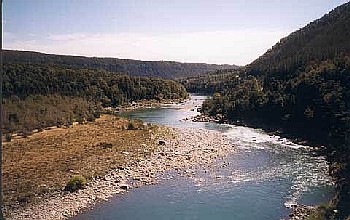 RALCO - Four elderly Pehuenche Indian women are blocking completion of a $570 million hydroelectric dam at Ralco in southern Chile, saying it would flood sacred land and destroy their way of life. (map)
RALCO - Four elderly Pehuenche Indian women are blocking completion of a $570 million hydroelectric dam at Ralco in southern Chile, saying it would flood sacred land and destroy their way of life. (map) RALCO - Four elderly Pehuenche Indian women are blocking completion of a $570 million hydroelectric dam at Ralco in southern Chile, saying it would flood sacred land and destroy their way of life. (map)
RALCO - Four elderly Pehuenche Indian women are blocking completion of a $570 million hydroelectric dam at Ralco in southern Chile, saying it would flood sacred land and destroy their way of life. (map)
For six years the women have rejected offers of money - up to $1.1 million - and land in exchange for their 103 acres on the banks of the Bio Bio River that Chile's Endesa power company needs to finish its giant power station project.
"They're not going to flood my land ... I'll only leave here when I'm dead," declared 78-year-old Berta Quintreman in front of her mud-hut home in the densely forested Bio Bio Valley some 370 miles south of Santiago.
Graffiti on a decrepit bus shelter outside her home reads, "Endesa, you won't remove us even for a sack of gold." Eighty-nine of the 93 Pehuenche families affected by Ralco have already accepted compensation and agreed to move to new properties up to 37 miles away.
The Chilean government and Endesa, which is controlled by Spain's Endesa, say the 540-megawatt dam, which is almost 90 percent complete, is crucial to meet Chile's energy needs and help economic growth.
However Indians and environmentalists have fought the project in court, saying it would destroy unique forests and endangered wildlife as well as ancient cemeteries, religious ceremonial grounds and Pehuenche communities.
Endesa aims to have the dam up and running by mid-2004 but the four women and their lawyers vow to fight to the end. Nobody knows when - or how - the dispute will end.
"This is the worst thing that could happen for the power generating system, this indecision over whether or not they will be able to flood the area," said Maria Isabel Gonzalez, former director of the government's energy commission from 1994 to 2000.
PINE NUTS AND MONKEY PUZZLE TREES
The Pehuenche get their name from the pine nuts which they gather from the "pehuen," or ancient monkey puzzle trees native to the Andean highlands. They belong to Chile's largest indigenous group, the Mapuche, which makes up 90 percent of the 692,000 indigenous people in Chile.
Pehuenche are believed to have inhabited the Bio Bio Valley, dotted with snow-capped volcanoes, since 1200.
The Mapuche have long clashed with forestry companies over land claims but the Ralco dispute united Indians, human rights groups and environmentalists alike.
Endesa insists the country's 1982 Electricity Law allows expropriation of private property to provide energy for the public good regardless of whether it is indigenous land.
However the 1993 Indigenous Law states land owned by native peoples cannot be sold without the owners' consent.
"This land is sacred. It cannot be bought with money," said Quintreman in her native tongue, wearing a colored head scarf half-covering her wrinkled brown forehead.
Endesa offered $1.1 million plus land to the four hold outs, who have unsuccessfully tried to negotiate much higher compensation.
Though the government has said the Ralco project will go ahead and the Pehuenche removed from their homes by force if necessary, the Indians believe they could be saved by a pending court ruling on whether the 1997 environmental impact study that paved the way for the dam was valid or not.
If the court were to rule the study invalid, Endesa may have to tear apart everything it has built so far of the dam. The company said last month that if this were to happen it would sue the government for the $570 million it has invested.
THE END OF A WAY OF LIFE
The Pehuenche opposing Ralco say the alternative plots offered by Endesa are either too isolated in winter or not suitable for farming.
Endesa says the Pehuenche are better off than before as the company has committed to 10 years of financial support, including new houses, electrification, school buses, technical farming assistance and promotion of the indigenous culture.
"We work with them every day maintaining irrigation systems...advising them on what to plant," said Claudio Sanhueza, director of Ralco's environmental project at Endesa.
But for Hilda Huenteao, whose mother Rosario is one of the four women opposing the project, the Pehuenche community has been irrevocably changed since Endesa arrived.
"Since Endesa came people have stopped going to the religious ceremonies...Women have stopped making craftwork because they have got jobs with Endesa," said Huenteao.
Huenteao says the Pehuenche believe that if nature is not respected it will avenge itself and adds that some Indians that exchanged their lands have since committed suicide.
"That is the punishment for not respecting nature's power. Now they are going to have to live with death," she said.
Story by Patrick Nixon
Story Date: 28/7/2003
alto bío-bío | chile | www.agp.org (archives) | www.all4all.org